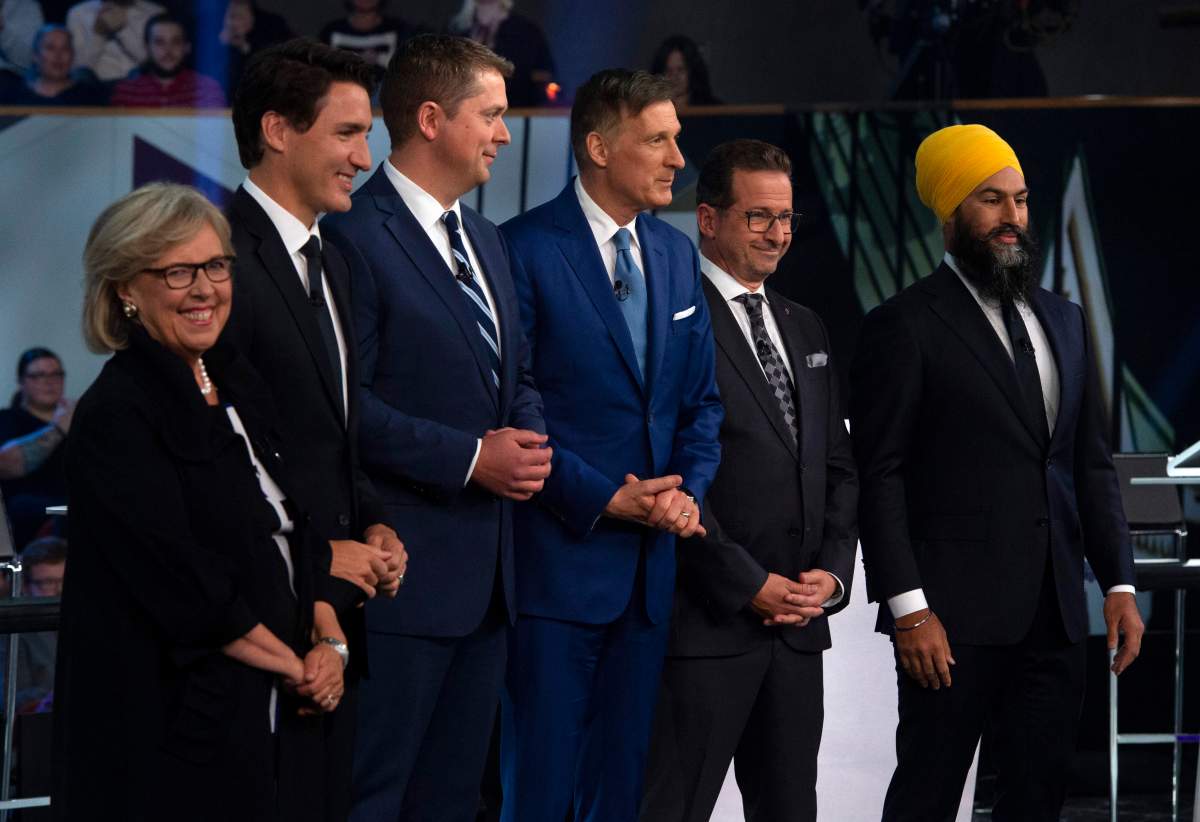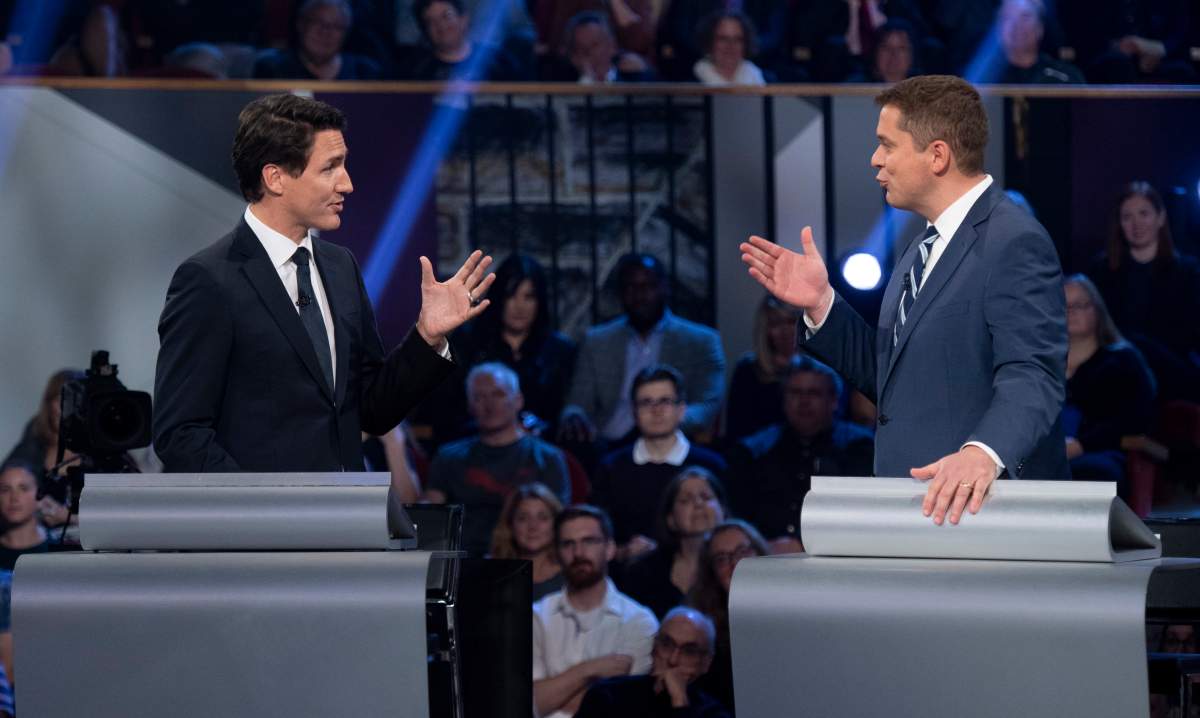A historic number of party leaders took the stage on Monday evening for the official English-language leaders’ debate of the 2019 federal election.

Liberal Leader Justin Trudeau, Conservative Leader Andrew Scheer, NDP Leader Jagmeet Singh, Green Party Leader Elizabeth May, Bloc Quebecois Leader Yves-Francois Blanchet and People’s Party of Canada Leader Maxime Bernier sparred over the course of two hours and made their pitch to voters from the Canadian Museum of History, two weeks ahead of the Oct. 21 election.
It was the first and only official debate to take place in English, and the only one so far to feature all six of the leaders.
READ MORE: Global presents federal leaders’ debate bingo
No other federal campaign debate has seen as many leaders take part, and all took the stage Monday night to vigorously deliberate the five topics up for debate.
Trudeau found himself largely on the defensive throughout the night, landing few hard hits on his opponents even as they focused their efforts on him.
Scheer kept his attentions almost entirely focused on blasting Trudeau’s record of governance, occasionally teaming up with Singh with support each others criticisms of Trudeau and arguing he has lost the authority to govern the country.

May focused her attacks largely on Trudeau but also responded to challenges from Singh, while he split his criticisms between attacking Bernier’s immigration proposals, Trudeau’s purchase of the Trans Mountain pipeline and May’s climate plan, which he suggested was not actually possible to implement.
Although the decision to include Bernier in the debate proved controversial — the leaders quickly attacked the decision after it was announced by the commission producing the debate — he was the first of the leaders in the hot seat with the first question from the moderators about whether his history on what critics call intolerant and discriminatory tweets make him qualified to lead the country.
“You have changed from someone who used to believe in an immigration system that was fair, orderly and compassionate, and now you are making your policy based on trying to get likes and retweets from some of the darkest corners of the Internet,” Scheer said.
“We believe in making Canada stronger by welcoming people to our country.”

Bernier frequently interrupted and spoke over the other leaders throughout the course of the debate as they also questioned him.
That prompted Blanchet at one point to start off his change to question Bernier by asking Bernier how long he would let Blanchet speak before interrupting — after which Bernier promptly interrupted Blanchet’s accusation that he was a climate change denier.
“Oh, you made 10 seconds!” Blanchet hit back.

The leaders had drawn slots for everything, from the order in which they could respond to questions, to their arrival schedule to the venue and as each party bus pulled up, a wall of supporters – kept about 40′ back from the entrance – waved signs and cheered or jeered at the leaders.

Get breaking National news
Among them was one person in a Captain America costume, and others with large models of the Earth, along with a small sea of red, blue, orange and green signs — and more than a few with megaphones.

Trudeau was the only leader to arrive without his partner or spouse at his side, and his group of advisors in tow included chief of staff Katie Telford, senior advisor Ben Chin, and former principal secretary Gerald Butts — all of whom were prominently named in the SNC-Lavalin scandal.
Trudeau came under fire from Scheer roughly halfway through the debate on just that issue as the topic shifted onto polarization, human rights and the economy.
“When did you decide that the rules don’t apply to you?” Scheer asked.
Trudeau repeated his past defence of what Ethics Commissioner Mario Dion ruled was inappropriate political interference in an attempt to intervene in the court case of the Montreal engineering giant, arguing it was his responsibility to protect jobs.
He also repeated the claim he made when the Globe and Mail first reported back in February 2019 that Trudeau’s government had sought to improperly interfere in the decision of then-attorney general Jody Wilson-Raybould not to save SNC-Lavalin from going to trial on corruption and fraud charges.
“They were false,” Trudeau insisted.

Dion, however, verified virtually every accusation made by Wilson-Raybould in her explosive testimony before the House of Commons justice committee and ultimately ruled that Trudeau broke the Conflict of Interest Act by attempting to interfere in the case — or getting his staff to do so.
Singh also attacked Trudeau over his handling of that case and contrasted it with the government’s decision to appeal the ruling from the Canadian Human Rights Tribunal that ordered the government to compensate Indigenous children for chronically underfunding the child-welfare system.
“He wanted to fight hard to keep SNC-Lavalin out of the courts but he wants to drag Indigenous kids though it,” Singh said.
READ MORE: Tories, Liberals tied ahead of leaders’ debate, Ipsos poll finds
Singh pressed about NDP position on Bill 21
For his part, Singh was pressed by his rivals and by reporters on his reluctance to interfere in a different court matter on Monday — that of Bill 21 in Quebec.
The popular secularism law was passed in June and bans civil servants in positions of authority from wearing religious symbols. A handful of groups are currently challenging Bill 21 in court — an issue that has surfaced during the federal election campaign.
Singh has made clear he’s personally opposed to the bill but that an NDP government would not interfere in the ongoing court challenge.
The NDP leader was asked on stage whether he was putting his parties’ interests — retaining crucial seats in Quebec — ahead of his principles, Singh said he takes every opportunity he can to voice his opposition to the bill.

Trudeau — who has said the Liberals have no plans to challenge Bill 21 but he hasn’t ruled out doing in the future — pushed Singh further on the issue.
“The federal government needs to protect minority rights, language rights, women’s rights… it needs to do that right across the country,” Trudeau said to Singh. “You didn’t say that you would possibly intervene, you don’t even leave the door open and that’s not leadership.”
“Let’s be honest for a second here – every single day of my life is fighting a bill like Bill 21. Every single day of my life is challenging people who think you can’t do things because of the way you look,” Singh replied.

Asked by reporters to clarify his position after the debate, Singh reiterated he believes it’s “very important” the federal government not interfere in the court challenge. On what he would do should the case reach the Supreme Court of Canada, Singh said it’s “a matter of fact” that a government and prime minister “takes a look” at any case that goes before the top court.
Scheer said a Conservative government would not intervene in the court case but Blanchet raised that a Quebec Conservative candidate had recently spoken of “protecting” Bill 21.

Asked by reporters what he thought of the leaders’ positions on the secularism law, Blanchet said he felt Trudeau’s position was much more clear than those of the NDP and Conservative leaders.
“People have a right within the next two weeks what precisely to expect from those two leaders,” Blanchet said.
Abortion, same-sex marriage
Social issues proved an explosive issue in last week’s TVA French debate and while they emerged again on Monday night, they didn’t appear quite as fiery as they did in that debate.
Scheer faced the brunt of the attack last week and came under fire again as the other leaders criticized his anti-abortion stance.
Trudeau also pushed Scheer on whether he would apologize for his past remarks opposing same-sex marriage, and pushed him to unequivocally say he would defend a woman’s right to choose whether she wants to have a child.
Scheer defended his position and would not commit to doing so but insisted as he has done repeatedly that a Conservative government would not reopen the matter. He has not, however, ruled out letting members of his caucus bring forward private members bills or motions that seek to restrict the right to choose.
At times, the debate saw the leaders all talking over each other on the matter of protecting the right to abortion.
May interjected, saying it was not a matter for men to be “arguing what a women’s right to choose should be.”
Latest IPSOS poll
The stakes were high for all six leaders, with poll after poll largely locked in place since the start of the campaign almost four weeks ago.
An Ipsos poll done exclusively for Global News found support for the Liberal Party is at 35 per cent among decided voters, a boost of just one point since last week, while support for the Conservatives is down three points at 34 per cent.
The NDP sit at 15 per cent while the Greens and Bloc are both at seven per cent.
The People’s Party sits at two per cent.





















Comments
Want to discuss? Please read our Commenting Policy first.